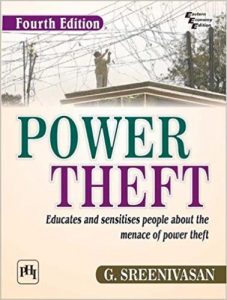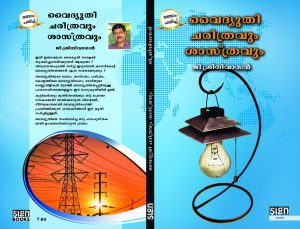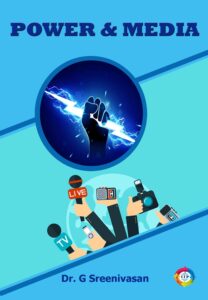Power and Media
This book contains the fundamental issues of the influence of media and changes in the public’s perception against power theft. This is the narrative of a societal disaster that was largely neglected by both society and specialists in the field. In addition to the studies, some personal experiences are also shared.
Societal problems impede a nation’s development. All unlawful transgressions are social sins. One such social vice is Power theft which has a significant role in the economic development of a country. Even though the issue has economic, geopolitical, environmental, and technical bases, the solution is typically sought only through technological methods. There must be human interventions also. Electricity was traditionally supplied by the Government with a subsidy in most nations. The public has been enjoying all government freebies for decades. When there is a barrier to this, they begin to consider how to engage in unlawful activity. This starts as an effort to keep the freebies coming. But over time, it develops into a means of making money.
How well aware is the media that electricity theft is a serious problem? How much has it helped to foster civic consciousness among the general public? Many media stories attempt to downplay power theft as a white-collar crime by shifting it from a financial crime to a felony. This study points a finger against such a reticent approach to the media. The media has a variety of responsibilities. Unless the media works as an educator, consumers are not well-informed about power theft and its implications. This book takes a look at media activity which is just another intellectual slavery without realizing its power and not being able to influence society.
Have these societal challenges been adequately analyzed by the media? Why does the media, despite the issues, continue to seem unconcerned? Have fledgling journalists examined the economics and social science underlying these issues with the serious consideration it requires? Why won’t the media conduct an objective analysis? It is debatable how power theft has been portrayed in the media as a severe financial crime. The fact is that people’s perceptions of power theft are not changing, and evident that the press is failing to shape public opinion.
The public’s perception did not shift overnight. Furthermore, both the media and education play a role in influencing public opinion. It is true that some advertisements in the past affected people’s views on social issues like the polio vaccination and child marriage, among others. The government does not currently make any such endeavour.
This book is the first to demonstrate a link between power theft and Indian media. It deals with the convergence of two crucial multidisciplinary concerns. It is about the power theft ruining our economy and the effort undertaken by the fourth pillar of democracy, the media, to control it. Many reports on the hardship being faced due to losses are available in the public domain. But it is silent on how Power theft affects a consumer directly. Power theft cannot be eliminated if the government alone decides so. The media can go to locations that the government cannot. As a result, the media should be the most knowledgeable about power theft. When the media becomes engulfed in disputes, it loses its desire to understand and inform.
Indian media is like a caged parrot. It cannot see the outside world. Have you ever seen a bird coming back to the cage even after leaving the nest? Indian media has been reduced to the same situation. Power theft mitigation and media studies may seem to be unconnected. However, there is no more excellent instrument for controlling power theft than the media. This social evil can be lessened if there is an active interaction between the media and the public. The case study includes information about the role of media in controlling power theft in Delhi. It also investigated how newspapers and television channels tackle this issue and evaluate it in light of the information obtained by media users and how it changes perception.
Statistics gathered through a sample survey from Delhi residents are also applied to determine the media’s influence on creating awareness against power theft. Is the information accessible through the media useful for influencing Delhi citizens’ perceptions? The efficiency of Delhi Discoms’ corporate communications in preventing this issue was also studied. A preliminary estimate of how much a Delhi consumer may have to spend more due to power theft is also presented.
Fake news, or misinformation intended simply to stir up controversy, is a disgrace to civilized society. This will add to the media system’s downfall. Most journalists assume that after a crime has been sensationally reported, the media’s job is done. Aside from that, there is no research or report available to inform the public. For press headlines and controversy, certain information is concealed. This is how the Indian media evolves. What prevents the media from taking a lead role? In Indian media, who influences the public sphere? How media promotes superstitions, media, and guardians of Indian democracy, monopoly interests, and media apathy, Media reporting on power theft in India, etc., are discussed.
This book is a modest attempt to raise awareness of the importance of Power theft in society and to expose the media’s success/failure to recognize it. The information is presented in the most concise manner possible. The media has shrunk to the point where ‘I don’t care about matters over which I have no influence’, and their counterparts in the power utility sector responsible for unearthing irregularities should understand that ‘passion, not age, counts.’
Life is a means of waking up for some. Others might choose to sleep. You could find the courage to attempt something new and venture into unknown terrain.
Power Glossary

Vidyutha Shabdavali (power Glossary)Author:G. SreenivasanPrice: ₹130
Thoughts Unlocked: Lockdown Days Musings

This book tells the stories of the past, present and future. It seems autobiographical and fictitious at times and written in a language that is lucid, mild, straight and with a touch of humour. The thoughts shared would create in every reader a ponderous urgency to look back to the lives we had in the past. The book is available at the following online stores.
Pages: 118
Price: ₹179
About the book
A pandemic made us all sad, mute and tremble with fear. We locked the entire world one day and isolated ourselves from each other. This book Thoughts Unlocked – Lockdown Days Musings is a riposte to a pandemic that has rendered the humans voiceless. It ruminates on how the pandemic made a larger impact on life. . The vibrant cultures and maligned myth of Yakshi, life in villages a half-century ago are also covered. I hope this book will be a great help in the freeing of our thoughts and presumptions
The Book

Power theft has become a major source of revenue loss to power utilities. Despite their efforts, power utilities have not been able to contain it. This book deals with the practice of power theft all over the world, with special thrust on the Indian scenario, and describes methods to control it.
The book discusses the various methods of power theft, giving a peep into the ingenuity and imagination of power thieves. Besides, it provides a graphic account of meter mechanism, meter dodging, state-of-the-art techniques of high-tech power theft, measuring principles, and methods of analysis of power theft. The book presents as many as fifty types of power theft with the help of suitable photographs so as to analyze the problem from various angles.
Besides being of practical interest to the students of Electrical Engineering as part of their courses on Power System, the book can be of principal interest to professionals engaged in electricity boards, power utilities and power training institutes, and energy auditors.
THE AUTHOR
G. SREENIVASAN is Executive Engineer with Kerala State Electricity Board[KSEB Ltd]. He is known in power sector academics circles as the author of ‘Power Theft’[PHI Learning[P] Ltd].He has been a guest faculty at premier Institutions like Administrative Staff College of India (ASCI), Hyderabad; Engineering Staff College of India (ESCI), Hyderabad; Reliance Energy Management Institute (REMI), Mumbai; and Central Institute for Rural Electrification (CIRE), Hyderabad.Mr. Sreenivasan, a technical writer, and a blogger is also an activist in the prevention of power theft. He has been highlighting the issues related to power theft all over the world to create awareness with a different perception. He has a long career in detecting high-tech power thefts and has passed through many hardships and dangers. As a member of International Utility Revenue Protection Association (IURPA), he has been closely associated with developments in this sector all over the world. He is pursuing a research study to explore the role of media in the prevention of power theft and can be reached at tamperfinder@gmail.com.
EVERYDAY ELECTRICITY
Everyday Electricity’ gives us an entertaining account of the marvelous discoveries of all time. The book provides a perspective to understand the most wonderful tool – electricity- by stringing history of Electricity, generation methods, transmission etc. into a semi-scientific narrative. ‘Electricity’ one of the greatest invention that shook ev erything to the roots after the wheel, is vital for the growth of every economy. Even though it is manipulated by a flick of a button or switch, electricity as such is a complex subject hard to comprehend for a common man.
erything to the roots after the wheel, is vital for the growth of every economy. Even though it is manipulated by a flick of a button or switch, electricity as such is a complex subject hard to comprehend for a common man.
The author intends to create awareness among general public, media, students, etc about the evolution of electricity, its various forms and basic characteristics. The most striking aspect of the book is its absolute clarity. It explains simply using apt illustrations about basic electrical concepts so that readers can get a broad idea about the subject and it seems the author succeeds in his endeavor when such attempts even from professionals often fail to do.
The organization of this book allows the reader to easily follow the concept of electricity. The book is divided into ten chapters beginning with ‘What is electricity?’ in which the basic concepts of electricity using symbolic representation is explained so that even laymen get a clear cut idea about the concept. The reader is taken on a journey through the evolution of electricity from way back in 900 BC to its present form and explained, in a nutshell, various studies, experiments, researches down the centuries before it has become as convenient as its present form.
From early stages of electricity in India to the stature it has achieved today is followed by ‘How does electricity reach our homes’ and throws light on transmission and distribution system. Basics of transformers, Energy meter, Demand-side management [DSM] etc.are incorporated. The book also focuses on electrical hazards, safety aspects etc. and the do’s and don’ts in simple language with pictorial representation. It is interesting how the author takes us through themes like energy saving at home, and the blackout in North India with an analogy of a tandem bicycle in a circle with a number of riders and pillions. The comparison is really interesting and comprehensible even for laymen.
The author sugarcoats difficult concepts with simple analogies. The difference of two synonymously used terms ‘Load shedding’ and ‘Power cut’, a nightmare for many to differentiate clearly is also narrated.
In the conclusion, the unparalleled changes in this sector are pointed out. Future scope and challenges in the field such as Wireless electricity, Smart metering, Renewable Energy, Electric vehicles, Real-time data measurement, Hydrogen fuel etc. are also mentioned. The author provides a peep into decentralized generation, digitalization of power system and privatization of this sector which according to him will be a reality in the near future.
The book is brought out by the Publication Division of Ministry of Information & Broadcasting, Govt. of India.
To buy online- CLICK HERE

To buy online- Contact Us






















